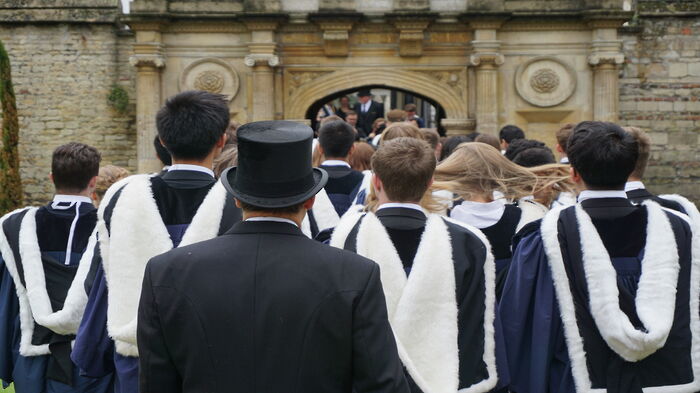We must burst the idea that Cambridge is a bubble
This fictional division between the University and the ‘real world’ is damaging and self-indulgent, writes columnist Siyang Wei

Easter Term is prime time for talking about the ‘Cambridge bubble’. It seems that life is supposed to shrink – we develop (or try to develop) a routine that takes us from bedroom to library, and maybe somewhere else for dinner if we’re feeling fancy. More broadly, however, the ‘bubble’ describes a division of university life and what we might call ‘real life’; we don’t go outside, we don’t venture into the ‘real world’, and as a result, the ‘real world’ and all its problems do not touch us.
Much of this rhetoric becomes about how we can “break the bubble” by improving ourselves – how to open our minds by leaving the Sidgwick site, wandering off well-trodden student paths, and perhaps even venturing out of the city on the busway (it’s very exciting). Leave the University, and get back into real life. For greatest effect, go and “check your privilege” by volunteering with a locally-based charity, and come away with the realisation that it’s the real problems out there that actually matter.
This, of course, isn’t a bad thing; it is healthy to remember that Tripos results are not the be all and end all of our lives, no matter what our tutors might have us believe. Yet I find myself troubled by how frequently the idea of the ‘bubble’ is invoked, and how easily a division seems to form between the ‘real world’ of Cambridge the town and, in turn, the ‘fake world’ of the University of Cambridge.
The University is constructed as a veil that serves to shield us from the social problems found outside
To me, the potential dangers of this separation are clearest in how we choose to discuss politics and social issues. Take the pressing issues of homelessness and socioeconomic inequality in Cambridge, where the bubble emerges as a trope again and again. The bubble of the University encloses the privileged lives of students in a controlled educational environment; meanwhile, poverty proliferates on our doorstep. The remedy, of course, lies in the responsibility of individual students to step outside the ‘fake world’ of the University – to cross the line that keeps our privileges within and social problems without.
These narratives may indeed help to raise awareness of local issues among the student body. However, they are also tired and unhelpful stereotypes that do not do justice to the complex reality of the University – or, indeed, of the social problems we might hope to address.
There are two major reasons for this. The first, as trite as it may sound, is that not every student is the embodiment of privilege – and for many, complete absorption in the bubble is a delicious impossibility, thwarted by the real circumstances of their lives. The rhetoric of the bubble limits the issues we consider to be directly relevant to students.
The second lies in its blurring of the relationship between the University and the ‘real world’: the University is constructed as a veil that serves to shield us from the social problems found outside. The idea of the bubble therefore has political consequences, as it diminishes the significance of the University and student politics in favour of thinking about ‘real world’ issues.
Our critique should not stop at highlighting the gulf between the wealth trapped within the University and the deprivation that is inherent in a city as unequal as Cambridge. If we, as students, really want to ask ourselves what we can do, it will mean abandoning this ‘bubble’ framework. The real perversity of the University’s presence is not that we supposedly live lavishly alongside poverty; it is that the institution itself, by virtue of being a formidable presence in the community, is inextricably linked to this community's problems – for example, through plans to build a separate “academic community” around new property in Cambridge’s north-west development. We cannot deny that the University and the ‘real Cambridge’ are in fact very closely connected, perhaps alarmingly so.
The greatest danger of the bubble is therefore the restraining of the ‘real world’ – and therefore real politics with real consequences – beyond the limits of the University. Far from being a bubble whose worst crime is cultivating embarrassing displays of opulence, the University is a hugely powerful institution that is deeply embedded in the local economy, and whose activity heavily shapes the material conditions of the town.
Just as the University is not a ‘fake world’ apart from the ‘real world’, student life and politics are not simply a low-stakes replica of the real thing. Rather, it is our responsibility as students not only to reach outwards, but to look both inwards as well as upwards – that is, into the management of the institution itself. By leaning too heavily into the rhetoric of the bubble, we risk effacing the significance of the University so much that we become passengers within the institution – and in its actions, unwitting accomplices.
 News / Clare Hall spent over £500k opposing busway 24 December 2025
News / Clare Hall spent over £500k opposing busway 24 December 2025 Comment / The ‘class’ of Cambridge24 December 2025
Comment / The ‘class’ of Cambridge24 December 2025 News / Caius mourns its tree-mendous loss23 December 2025
News / Caius mourns its tree-mendous loss23 December 2025 Comment / League tables do more harm than good26 December 2025
Comment / League tables do more harm than good26 December 2025 News / Eight Cambridge researchers awarded €17m in ERC research grants27 December 2025
News / Eight Cambridge researchers awarded €17m in ERC research grants27 December 2025










